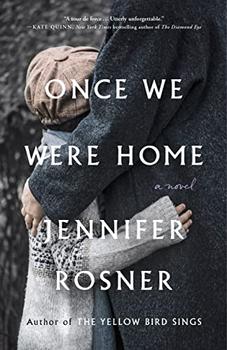Summary | Excerpt | Reading Guide | Reviews | Beyond the book | Read-Alikes | Genres & Themes | Author Bio

Mischling begins when twelve-year-old twins Pearl and Stasha Zamborski arrive at Auschwitz in a cattle car with their mother and grandfather, where they are immediately separated from their family to become residents of a Human "Zoo" of sadistic experiments, run by Dr. Josef Mengele, who is commonly known as the "Angel of Death." However, the story really unfolds in the womb where, as Stasha tells us, the girls were "afloat in amniotic snowfall, two rosy mittens resting on the lining of our mother." This is a story where love and connection are so strong, they can — and must — withstand all manner of barbarity.
While in some ways the twins are protected as Mengele's prized "pets," they are subjected to horrifying physical and psychological experiments. One twin is locked in a cage and tormented, the other believes Mengele's claims that he has made her immortal. These are two distinct versions of hell, narrated in alternating chapters as the point of view shifts between Pearl and Sasha. Upon the liberation of Auschwitz, the girls are separated. One is on a mission to seek safety with a group of fellow survivors. The other, believing her sister to be dead, is on a mission to find Mengele and exact revenge. Their journeys intersect in literal and metaphorical ways as they try to reconstruct a life and identity amid the crumbling of Eastern Europe.
Full of rich historical detail, Mischling is a captivating story of survival in the worst circumstances imaginable. The author, Affinity Konar, makes these details visceral as we experience them through the sensibilities of the twin narrators, the scorched scent in the air from the crematoriums, a room with eyes pinned to the wall, and other unbelievable (but true) horrors taken from real accounts of survivors (see 'Beyond the Book').
Despite these atrocities, there is a mystical wonder present in the story — the world may be in flames, but the universe provides. When the travelers are most weary, a getaway horse appears. When Pearl desperately needs crutches, her prayers are answered. Jewish Resistance fighters emerge from the night like mythical heroes to slay an enemy. None of these instances feel silly or contrived. There are also compelling and well-developed supporting characters: a haunted Jewish doctor forced to work under Mengele's command, and other "Zoo" dwelling misfits, a grieving boy with a tail, and a tough-talking Russian albino with a loud mouth and secret gentle heart. There is even humor. Stasha in particular is funny, remarking that one of their large captors resembles "a wardrobe with a toupee." This is not to say that the book is not sad, just that it is not only sad.
The girls possess a startling and inspiring level of resolve. Stasha declares early on her determination to "be more than an experiment in this world." Both girls take solace in a game called "The Classification of Living Things," where people are judged by their animal characteristics, and the recitation of species, genus, family, order, and class is a calming mechanism. This family tradition, along with the twins' intuition links the two narratives in clever ways as they think similar thoughts and even feel each other's pain. The book's title comes from the German word for "mixed blood," which Stasha boldly reclaims to relate to herself as "of two parts," one of "loss and despair" and one of "wild hope."
This thread of "two parts" gets at the heart of the book. The horrors of the concentration camp are dwarfed by a greater conflict – the twins' separation: "I was a broken half afloat in a great nowhere," Stasha says. Everything inflicted on the girls by Mengele is survivable but to be apart from one another is not. As Pearl says: "this is not about that man, as much as he would have liked it to be." It is hard to describe the alchemy that Konar performs to make this story so uplifting. In a way, she has created a kinder, gentler twin experiment of her own: how will Sasha and Pearl, "two parts," so alike, but so different in disposition, face and overcome their traumas, with rage or with kindness, vengeance, or forgiveness. The results of this experiment, unlike those conducted at Auschwitz, actually has value for humanity.
![]() This review was originally published in The BookBrowse Review in September 2016, and has been updated for the
June 2017 edition.
Click here to go to this issue.
This review was originally published in The BookBrowse Review in September 2016, and has been updated for the
June 2017 edition.
Click here to go to this issue.

If you liked Mischling, try these:

by Jennifer Rosner
Published 2024
From Jennifer Rosner, National Jewish Book Award Finalist and author of The Yellow Bird Sings, comes a novel based on the true stories of children stolen in the wake of World War II.

Djinn Patrol on the Purple Line
by Deepa Anappara
Published 2021
In this transporting debut novel, three friends venture into the most dangerous corners of a sprawling Indian city to find their missing classmate.
Your guide toexceptional books
BookBrowse seeks out and recommends the best in contemporary fiction and nonfiction—books that not only engage and entertain but also deepen our understanding of ourselves and the world around us.